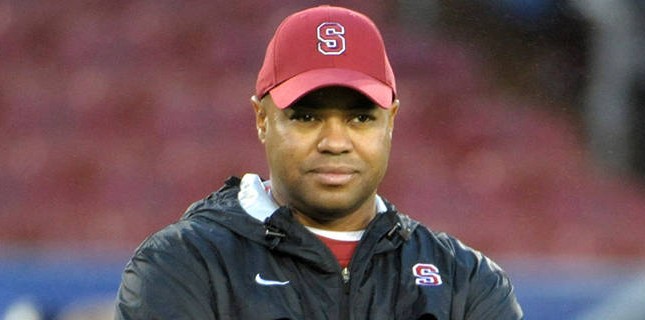Precisely because the Stanford Cardinal struggled so profoundly in their week-one loss to Northwestern, Saturday night’s game against the USC Trojans did not acquire the centrality it figured to own before the season began.
The fact that Stanford got knocked off by Northwestern was not overwhelmingly surprising; the shock value in that game flowed from the Cardinal being so utterly unprepared for what came their way. Kevin Hogan, a been-there-done-that quarterback, looked like a nervous freshman more than a veteran of two Rose Bowls, one of them as a winner.
With USC sporting awesome skill-position talent such as receiver JuJu Smith-Schuster — the kinds of players Stanford does not have — it seemed hard to think that the Cardinal would be able to keep up with USC in a track meet. The conventional line of thought on this game was that while Stanford needed to be a lot better on offense, it would have to contain USC to the point that the Trojans couldn’t develop any sustained offensive consistency.
So much for conventional wisdom.
*
In what did indeed turn out to be a track meet, Stanford was better equipped to run the race. The Cardinal might not have owned the home-run threat USC did, but the Cardinal were their best selves on Saturday, blending their power football with downfield strikes. Hogan had a full playbook at his disposal and looked the part of a liberated leader. David Shaw was rightly raked over the coals after his timid display against Northwestern. He regrouped against a UCF team whose season lies in ruins after a loss to Furman on Saturday. That game was never going to tell us if the Cardinal had grown from their loss in Evanston, Illinois.
This game against USC was going to tell the tale.
Shaw clearly answered the call, meeting the moment by getting his players to progress from week one to week three. In many ways, Stanford became the first team in the 2015 college football season to convincingly prove that a week-one performance does not represent the final verdict on a season or its expected quality. This happens every season, and the dynamic reaches out to many teams, not just a handful, but Stanford crashed through the door first. When a coach is able to turn around his team in these volatile early months of the season, it speaks to his quality.
Shaw can be a stubborn mule with the play sheet at times, but if doubts were emerging about his ability to lead Stanford into the post-Harbaugh era, this game — here, on Saturday night — just did a lot to calm the nerves of the Cardinal faithful.
On the other side of the divide, the outlook could not be more different.
*
This game meant even more to Steve Sarkisian than it did to Shaw. Sark, after all, has never made a Rose Bowl as a head coach. He’s never achieved anything of note as a head coach. Like his predecessor, Lane Kiffin, Sarkisian “failed upward” to get the USC job. He attained the post without having done anything previously as a head coach to recommend himself for the job.
Sarkisian also brought Justin Wilcox from the University of Washington, doubling down on his UW tenure and saying, “The people I had in Seattle are the people I’m bringing with me to Los Angeles. I believe in the way I have been doing things, even though I didn’t have the results to show for it.”
There is simultaneously something very admirable about that approach — loyalty — and something very off-putting, namely, a refusal to make fundamental adjustments when outcomes suggest one should.
At any rate, the fact that USC athletic director Pat Haden went back to the Pete Carroll coordinator tree, combined with the fact that Sark brought Wilcox with him, placed that much more responsibility on Sark to make things work. When the 2014 season didn’t work out, 2015 — with ample talent and the preseason buzz to match — became an early referendum on Sark. No second-year coach faced more pressure than he did.
Then came the drunken episode which — in microcosm — wasn’t that big a deal, but which, when piled on top of everything else, reinforced the idea that Sark had a lot to prove in terms of how he carried himself as the leader and face of a proud program searching for a return to the pinnacle in college football.
If Shaw had to show that he could lead Stanford — and his own players, not Jim Harbaugh’s recruits — into the future, he at least had the cushion of knowing he had already made three BCS bowls and two Rose Bowls, winning one.
Sark? He had no such accomplishments to fall back on.
One coach on The Farm dramatically reaffirmed his place in the Pac-12 and on a national level. David Shaw came through on a night when he desperately needed to be at his best.
The other coach? Like Lane Kiffin just a few short years ago, Steve Sarkisian is engulfed in a sea of doubt and despair. His obliviousness to the need to kick a field goal in the final minute of regulation — with USC needing two scores, not just one — showed that he’s currently out of his depth. If he doesn’t find his sea legs quickly as a head coach in L.A., he’s going to meet the same fate Kiffin did.
Maybe the failure of Sarkisian is the thing USC needs to finally turn talent into results once again.
Pete Carroll showed that for all the talent one can put on a field, a leader has to make that talent mesh. USC still lacks that leader, as a program lurches toward another mini-crisis which has to be halted as soon as possible.
Stanford, on the other hand, can still be confident that it has the right man for the task.

